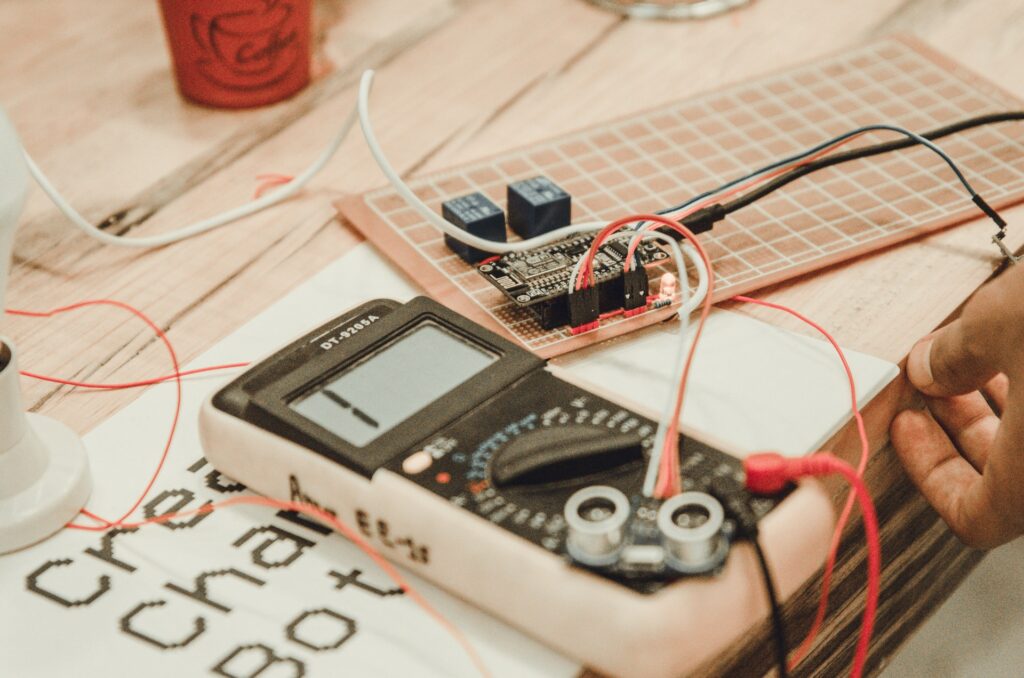What is Electrical Engineering?
Electrical engineering is an engineering discipline concerned with the study, design and application of equipment, devices and systems which use electricity, electronics, and electromagnetism. These range from microscopic computer components to large power networks. It’s one of the newer branches in the engineering field, and originates from the late 19th century after commercialization of the electric telegraph, the telephone, and electrical power generation, distribution and use.

Electrical engineering is now split into a wide variety of sub categories, including power engineering, computer engineering, signal processing, telecommunications, radio-frequency engineering, instrumentation, and electronics. Many of these specialties cross over with other engineering disciplines, spanning a large number of areas including mechatronics electrical materials science, electromagnetics, renewable energies hardware engineering, electrochemistry, power electronics and waves, microwave engineering, nanotechnology, .
Many employers state that entry-level electrical engineers must hold a minimum bachelor-level electrical engineering degree from a program accredited by the Accreditation Board for Engineering and Technology. Practicing engineers can also hold professional certification and can also become a member of a professional body or an international standards organization. These include the Institution of Engineering and Technology (IET) (formerly the IEE), the Institute of Electrical and Electronics Engineers (IEEE) and the International Electrotechnical Commission (IEC. The IEC arranges international standards for electrical engineering, developed through general agreement.
Electrical engineers design, create, and run electrical devices and tools, including power generators, motors communications systems and navigation systems, and electrical systems for automobiles and aircraft. They also oversee the manufacture of these devices, systems, and equipment.
History of Electrical Engineering
Static charges and primitive batteries were included in some of the first experiments with electricity. The true design, manufacturing and construction of useful systems and devices, started with the use of Michael Faraday’s Law of Induction, this outlines that the voltage in a circuit is proportional to the rate of change in the magnetic field through the circuit. This law applies to the basic principles of the electric motor, electric generator, and the transformer. The onset of the contemporary age is noted by the introduction of electricity to businesses, industry and homes , this was all possible because of electrical engineers.

Electronics is also included in electrical engineering, this has branched itself into a larger form of subcategories, such as , signal processing, instrumentation, audio, digital circuits, remote sensing, optoelectronics and video, radio frequency (RF) systems and telecommunications.
In 1904, John Ambrose Fleming invented the thermionic valve diode vacuum tube in which the field of electronics was started with. The vacuumed tube outputs a multiple of its input current therefore acts as a current amplifier. It was the main skeleton of all electronics, including radar, radios, and television this was until the mid-20th century. It was then replaces by the transistor, this was created by Walter Brattain, William Shockley, John Bardeen in 1947 at AT&T’s Bell Laboratories , they received the 1956 Nobel Prize in physics for this creation.
Electrical Engineering Education
In order to pursue a career as an electrical engineer, an individual must first meet a number of criteria. Most importantly, an aspiring electrical engineer must complete a bachelor’s degree from a four-year college or university, specifically in the field of electrical engineering. And while it is not entirely necessary to obtain a four-year bachelor’s degree from a program that has been accredited by the Accreditation Board for Engineering and Technology, Inc. (ABET) – a subgroup of which is the Institute of Electrical and Electronic Engineers (IEEE) – doing so will truly help the engineer’s future employment prospects. A four-year degree from an ABET-accredited institution is one of the prerequisites of obtaining a Professional Engineer license, which allows the holder to perform a wider array of work that generally involves a greater number of scope of responsibilities, including providing engineering consulting services directly to the public.
It is important to note that in some circumstances an individual may find work as an electrical engineer even if he or she didn’t obtain a bachelor’s degree in that specific field. For example, an individual with a degree in civil or mechanical engineering who took courses on electrical engineering and shows exceptional skill in this area may be able to work as an electrical engineer. Furthermore, some students may obtain a bachelor’s degree in an entirely separate field, and then a master’s degree in electrical engineering; these individuals would all be eligible to find work in the field.
After an individual has obtained a degree in electrical engineering, he or she can begin working in this field immediately. And, after a period of time, he or she will then become eligible to pursue a Professional Engineer license through the National Society of Professional Engineers (NSPE). As mentioned above, obtaining licensure as a Professional Engineer allows the holder to work in a wider array of vocations that demand a greater deal of responsibility.
Electrical Engineering Careers
The federal government, research manufacturing and development industries and engineering servicing firms are the primary workplaces of electrical engineers. They mostly work in offices, however they may be needed to visit sites to troubleshoot intricate pieces of equipment.
Jobs
Overall employment of electrical and electronics engineers is projected to grow 2 percent from 2018 to 2028, slower than the average for all occupations. Employment growth is expected to be tempered by slow growth or decline in most manufacturing industries and in telecommunications, according to the BLS. Industries in the manufacturing area that employ electrical engineers include but are not limited to consumer electronics, traffic control, commercial construction railroad, aerospace, telecommunications, marine, defense, automotive, lighting, computers and components. Government institutions also employ electrical engineers , the areas they would usually work in are the military, national laboratories and transportation departments.
A minimum of a bachelor’s degree in engineering is needed for most electrical engineering jobs. State certification as a Professional Engineer are required by many employers, particularly those offering services to the public. Also, employers may require certification from the Institute of Electrical and Electronics Engineers and/or the Institution of Engineering and Technology. If an engineer aspires to advance into managerial roles they they must obtain a masters degree for this. Additionally, furthering training and education are required to keep up with the ever advancing government regulations, computer hardware, testing equipment, technology and software.

Salaries
As an entry-level electrical engineer that holds less than one year of experience, the average total wage of $65,995 can be expected based on 2,846 salaries. An early career electrical engineer with one to four years of experience earns on average of $70,848 based on 9,450 salaries. A mid-career electrical engineer with five to nine years of experience earns an average of $83,504 based on 4,493 salaries. An experienced electrical engineer with 10-19 years of experience earns an average total compensation of $97,223 based on 2,648 salaries. In their late career (20 years and higher), employees earn an average total compensation of $108,539, according to PayScale.com.
The top companies that advertise the position electrical engineer are Northrop Grumman Corporation, Raytheon Co. and The Boeing Company. Reported salaries are highest at The Boeing Company where the average pay is $80,025. This role is offered at a higher salary rate from other companies including Black and Veatch and Northrop Grumman Corporation, earning around $79,135 and $78,954, respectively. Lockheed Martin Corp positions lowest paid at around $71,447. BAE Systems Inc. and Raytheon Co. also pay on the lower side, paying $74,751 and $75,746, respectively.
What Do Electrical Engineers Do?
Electrical engineers work on a large range of jobs, such as radars, navigation systems, lighting and wiring in buildings, electrical systems, computers, robots and cell phones. Electrical engineers rely heavily on Computer-Aided Design (CAD) systems for the designing of illustrations and to establish circuits, they also utilize computers to imitate how electrical systems and devices will work.
Electrical engineers carry out work in many different industries, therefore the type of skills required also vary. Skills can vary from basic circuit theory to project management skills . An electrical engineer may also need different equipment and tools that also vary, these can range from top end analyzers to a basic voltmeter to an advanced manufacturing and design software.
Responsibilities
The job responsibilities of an electrical engineer include:
- Certifying conformity to customer requirements, codes or specifications by coordinating or directing manufacturing, construction, maintenance, documentation, support, testing activities or installation
- Writing reports and compiling data regarding existing and potential electrical engineering projects and studies.
- Discussing with clients, engineers, and others to converse about potential and existing engineering projects or products .
- Guarantee that operations and installation com[ly with measures/ standards and client requirements by creating electrical systems topographical map, technical drawings and specifications.
- Creating, designing and maintaining / improving electrical instruments, components, equipment, products, facilities or systems for industrial, commercial or domestic purposes.
- Performing a wide range of engineering tasks by operating computer-assisted design or engineering software and equipment.
- Organizing manufacturing, installation standards, specifications or construction, by performing a large variety of intricate calculations.

Skills
Electrical engineers draw on a thorough knowledge of science and mathematics to solve problems and move complex projects forward. Successful professionals in the field need a solid foundation in methods for analyzing, building and preserving electrical equipment and systems. The following are some of the most important skills needed for electrical engineering:
- Apply linear systems theory and analysis
- Build and operate computer systems
- Circuit design
- Data collection and analysis
- Develop electrical schematics
- Direct construction activities and equipment upkeep
- Electronic equipment maintenance
- Prepare operational plans
Future of Electrical Engineering
Electrical engineers have a “versatility in developing and applying emerging technologies,” the BLS says. emerging technologies for these applications include studying sprites which are red electrical flashes, these hover over thunderstorms. A model has been developed by Victor Pasko, an electrical engineer at Penn State, to show how strange lightning evolves and disappears.
Andrea Alù, an engineer that is studying sound waves at the University of Texas at Austin, and has designed a one-way sound machine. “I can listen to you, but you cannot detect me back; you cannot hear my presence,” Alù told LiveScience in a 2014 article.
Additionally Michel Maharbiz, who is an electrical engineer at the University of California is currently looking at channels to speak with the brain wirelessly.
Major medical applications are included in the future of electrical engineering. Electrical equipment carry out many treatments of diseases . For example, to identify is an individual has diabetes, they may wear a watch which will give positive or negative result.. This watch will then give the blood sugar level of the individual and a report with his results.
The BLS states, “The rapid pace of technological innovation and development will likely drive demand for electrical and electronics engineers in research and development, an area in which engineering expertise will be needed to develop distribution systems related to new technologies.”

The future is navigated by advancements in technology. Electrical engineers have developed navigation systems, lighting, wiring, radars, robots, computers, and cell phones that are used by each of us in everyday life. The health sector is an area that has been impacted radically by the work of electrical engineers. As a qualified electrical engineer, they have the ability to create devices and applications that can aid health professionals modernize their services.
Engineers work by outlining how new devices and electronics should operate. More recent advanced technologies have been integrated into the engineering market, this includes driver-less trucks and cars as prototypes for examination before they can be fully introduced into modern life. Not too far into the future, driver-less trucks will be traveling alongside other road users, this will only be when the technology has been fully tested, re-tested and then deemed roadworthy!
If you have anything to add, please feel free to leave a comment down below, and sign up to our newsletter for more of the same content!




It’s wonderful to know that one of electrical engineer’s job responsibilities is to perform several engineering tasks by using computer operated software. In all kind of projects, there are always electrical components that need to be worked on by the professionals who already learnt the way to operate those things. I would like to think if a company is doing a construction, they need to hire a reputable electrical engineering service that is experienced and reliable.
Hi Taylor, yes it extremely important to ensure that the electrical side of any project is taken care of in the proper manner, as the other engineering trades depend on the electrical side for power, and safety systems like fire alarms etc. need to be able to function properly.
It was nice to hear your thoughts on it!
thanks